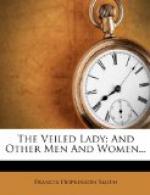“She’s fired because she wouldn’t do your dirty work. Look at this!”—he had straightened out the crumpled sheet now: “Look at it! That’s your work!—ain’t a dog would a-done it, let alone a man. Do you know what’s happened? That girl’s mother went crazy when she saw that picture! You sent that catamount, Miss Parker, to do it, and she done it fine, and filled it full o’ lies and dirt! Ye didn’t care who ye hurt, you—”
The man sprang to his feet.
“Here!—put yourself outside that door! Get out or I’ll—”
“Git out, will I!—Me!—I’ll git out when you eat yer words,—and you will eat ’em. Down they go—”
Joe had him by the throat now, his fingers tight under his chin, his head flattened against the wooden partition. In his powerful grasp the man was as helpless as a child.
“Eat it,—swallow it!—More—more—all of it! damn ye!”
He was cramming the wad between the editor’s lips, one hand forcing open his teeth, the other holding his head firm against the wall.
Then flinging the half strangled man from him he turned, and facing the crowd of reporters and employes —Miss Parker among them,—shouted:—
“And ye’re no better,—none o’ ye. Ye all hunt dirt,—live on dirt and eat dirt. Ye’re like a lot o’ buzzards stuck up on a fence rail waitin’ fur an old horse to die. Ain’t one o’ you reporters wouldn’t been glad to do what that catamount over there done last night, and ain’t one o’ ye wouldn’t take pay fur it. Katie Murdock’s fired? Yes,—two of us is fired, —me and her. We’ll go back whar we come from. We mayn’t be so almighty smart as some o’ you city folks be, but we’re a blamed sight decenter. Up in my country dead girls is sumpin’ to be sorry fur, not sumpin’ to make money out’er, and settin’ a poor mother crazy is worse’n murder. Git out o’ my way thar, or I’ll hurt some o’ ye! Come, Katie!”
THE BEGUILING OF PETER GRIGGS
Peter was in his room when I knocked—up two flights of stairs off Washington Square—Eighth Street really—in one of those houses with a past—of mahogany, open wood fires, old Madeira in silver coasters pushed across hand-polished tables,—that kind of a past.
None of all this could be seen in its present. The marble steps outside were worn down like the teeth of an old horse, and as yellow; the iron railings were bent and cankered by rust; the front door was in blisters; the halls bare, steps uncarpeted, and the spindling mahogany balusters showed here and there substitutes of pine.
Nor did the occupants revive any of its old-time charm. The basement held a grocery—a kindling-wood, ice and potato sort of grocery; the parlor boasted a merchant tailor—much pressing and repairing, with now and then a whole suit; the second floor front was given over to a wig-maker and the second story back to a manicure. Here the tide of the commercial and the commonplace stopped—stopped just short of the third floor where old Peter Griggs lived.




